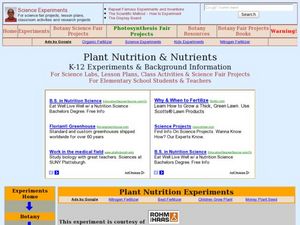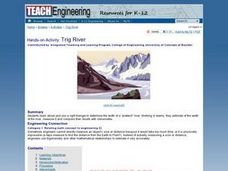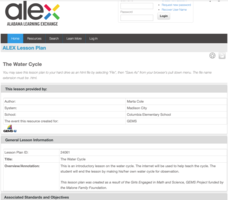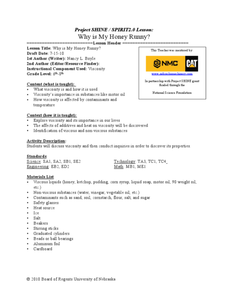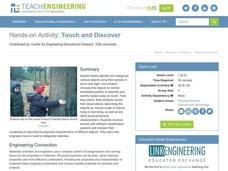Curated OER
What's The Matter: A Sinker or Floater?
Students conduct an experiment. In this water lesson, students watch the lesson "Float and Sink" on an interactive website. Students learn how to test items in water and then work in groups to test their items. Students discuss their...
Curated OER
Plant Nutrition and Nutrients
Students observe seeds growth and examine the different parts of the seedling. In this biology lesson, students compare the growth of seeds planted in soil and in hydroponics. They record their observations in their science journal and...
Curated OER
TE Lesson: Using Heat from the Sun
Students examine fossil fuels, nuclear and renewable fuels. They study investigate types of heat transfer such as convection, conduction, and radiation. They complete crossword puzzles based on the vocabulary. They design, construct and...
Curated OER
Immigration Unit
Third graders develop an appreciate for the various cultures that are present in their local community. Through reading and research, they explain how various culture came to live in their area. At the conclusion of the unit, 3rd...
Curated OER
Tornado!: Types and Formation
Students discuss the different types of tornadoes and how they form. Working in groups, they record journal entries by conducting experiments with water bottles simulating vortex formation.
Curated OER
Harnessing Wind
Students explore the ways that engineers study and harness the wind. They study the different kinds of winds and how to measure wind direction. In addition, students learn how air pressure creates winds and how engineers build and test...
Curated OER
TE Activity: Hot or Not
Students examine how the human immune system responds to germs and explain what a fever is. They design a thermometer in order to further explore temperature before completing a temperature conversion worksheet. They detail the work of...
Curated OER
Trig River
Students calcute distances using trigonometry and angle measurements. They estimate the width of the Trig River, measure it and compare their results with their classmates. They collaborate with a group to research and find the results.
Curated OER
Numbers in Art
Students choose a number from one to twelve and tell a number story about it. They listen to the teacher read "Numbers in Art" by Lucy Micklethwait. Students choose three numbers from one to twelve and view works of art while looking for...
Curated OER
Root, Root, Root for the Nutrients
Students observe the growth of a seed, predict what will happen when seeds are planted without soil, and conduct an experiment using a hydroponics system.
Curated OER
Determining pH
Students evaluate pH levels through a solubility experiment. In this pH levels lesson, students list characteristics of acids and bases. Students complete their own pH level experiment. Students go to the GEMS Alien Juice Bar website to...
Alabama Learning Exchange
Tornadoes
Students research tornadoes. For this weather lesson, students construct a KWL chart on tornadoes and view the video National Geographic-Tornadoes. Students discuss the facts they learned from the film and complete the KWL chart.
Curated OER
From Sunlight to Electric Current
Students explore concept of current in electrical circuits. They examine how energy from the sun can be used to power everyday items, including vehicles.
Curated OER
Who's Down the Well?
Students identify several sources of contaminants to groundwater. They discuss the movement of possible contaminants through that groundwater from outside sources. They describe how environmental engineers analyze contaminants to...
Curated OER
What Trickles Down?
Students explore different levels of permeability and compare the permeabilities of several different materials. They are introduced to the basic concepts of building design, landscape architecture, and environmental pollutant transport....
Curated OER
Beyond the Earth Part II
Learners explore the solar system. In this solar system lesson, students use Internet and print resources to research a component of the solar system. Learners create travel brochures based on their research findings.
Curated OER
Beyond The Earth Part I
Students explore the solar system. In this space science lesson, students take notes on the solar system provided by their instructors. Students then collaborate to design a computer-generated drawing of the solar system.
Alabama Learning Exchange
This Is How We Roll!
Students research how roller coasters work. In this physics lesson, learners research the history of roller coasters and the safety factors in the design of a roller coaster on the website www.learner.org/exhibits/parkphysics. They...
Alabama Learning Exchange
The Water Cycle
Young scholars explore the water cycle. In this earth science lesson plan, they read the book Water Dance by Thomas Locker and use an interactive whiteboard to review the water cycle with an interactive website.
Alabama Learning Exchange
Musical Patterns
Young scholars explore the concept of patterning using musical instruments. In this music lesson, students identify several instruments and practice playing patterns with them. Young scholars identify the patterning in a musical piece.
Alabama Learning Exchange
Bird Migration
Students study the concept of bird migration. In this bird lesson, students read Make Way for Ducklings, discuss the concept of community, and write reflections.
Curated OER
Why is My Honey Runny?
Students identify the factors that affect viscosity of substances. In this chemistry lesson, students define what viscosity is in their own words. They give real world applications of viscosity.
Curated OER
Touch and Discover
Pupils work together to identify and categorize objects. They have to identify the object on touch because they are blindfolded. They record their data and describe the objects once they can look at them.
Alabama Learning Exchange
Writing Word Equations
Students explore the concept of chemical formulas. For this chemical formula lesson, students watch a video about balancing chemical equations. Students conduct an experiment using silver nitrate and sodium phosphate. ...



